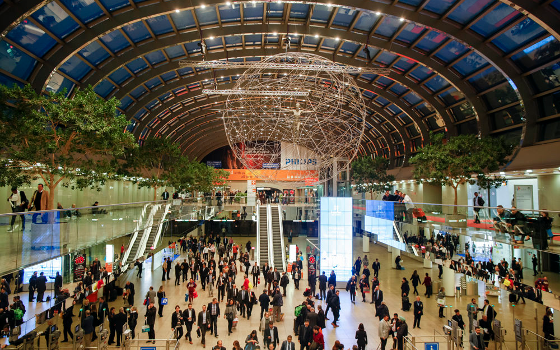Once again, the world's biggest medical trade fair MEDICA and the leading international supplier trade fair COMPAMED, which take place in Düsseldorf, have provided a powerful stimulus for the international medical technology industry. For each of the four days of the fair, from 14 to 17 November 2016, specialists from all sectors of the health industry ensured that the daily intake of visitors was consistently high (127,800 / equal to last year's number) in the trade fair's 19 halls, which were fully booked by exhibitors.
In addition to exciting topics which have been "electrifying" everyone in the sector, no matter where they are from (the keyword here is digitisation), it has been noticeable that, above all, the business relationships between providers and clients have fundamentally changed. Pure product orientation is a thing of the past. Medical technology companies negotiate systems partnerships with hospitals and medical facilities that are designed for the long term within the scope of comprehensive process optimisation.
"Now more than ever, medical technology companies are focusing on top decision makers on the demand side, particularly those from hospital management and purchasing bodies. MEDICA fully lives up to this trend. Over 80 percent of our trade visitors have significant decision making power," summarises Joachim Schäfer, Managing Director of Messe Düsseldorf. Other factors could come into play for the more than 5,000 MEDICA 2016 exhibitors (the largest exhibitor number to date) with respect to the export business, which is experiencing a particularly high growth rate. Joachim Schäfer explains: "The MEDICA, as a space for global business and creating contacts in all important markets, is simply unmissable. Our specialist visitors came from over 140 different countries, with Asian emerging countries being particularly well represented. Around 60 percent were international visitors, which is a new high."
Richard Wolf GmbH provides a particularly strong example of how a provider for individual specialist products can transform itself into a comprehensive solution system provider. The company, originally known for its endoscope systems, exhibited, among other items, a new ENT diagnostic navigation system in Düsseldorf and now also offers solutions for operation-theatre integration. This integration comprises the centralized control of different devices and equipment (from different manufacturers) in operating theatres. Richard Wolf GmbH underlines this change in position with a new approach to its MEDICA presentation. "In terms of strategy, we are now concentrating on selling entire systems as opposed to individual instruments. Consequently, we have also changed our distribution structure - we are pulling away from general traders and converting to distributors with expertise in specialist fields. We use MEDICA in the traditional manner to find new contacts within the market," says Jürgen Steinbeck, CEO of the Richard Wolf Group, describing the targeted process.
One subject that currently affects almost all exhibitors and visitors equally, and which was also on the lips of everyone in the conference halls, is the rapidly advancing digitisation of the healthcare industry, which aims to connect the actors in the treatment process. In addition to the exhibitors' innovations, the integrated MEDICA forums (i.e. the MEDICA HEALTH IT FORUM and the MEDICA CONNECTED HEALTHCARE FORUM) provided a wide range of offers which corresponded to this subject, which were attended by a great number of visitors.
Diverse conference programme proves to be an expert magnet
The essential market trends were also expanded upon with the content of the accompanying conference and convention programme, which were oriented to target groups. They were, as usual, very well attended. Among others, the MEDICA PHYSIO CONFERENCE, with its main theme this year of "Joints and Joint Replacement", and the MEDICA MEDICINE SPORTS + CONFERENCE, oriented towards specialists from the sport and preventative medicine sector, serve as excellent examples here.
The 39th German Hospital Conference offered [around 2,000 participants] a multitude of health politics and practice-oriented sessions as part of this year's general theme of "Shaping the Future", serving as a significant communication platform for clinical management. The most famous visitor was the German Federal Minister of Health, Hermann Gröhe, who caught up on selected innovations for modern and connected patient-centred care on a tour of the exhibition after the opening of MEDICA 2016 and the German Hospital Conference.
In connection with MEDICA, COMPAMED was held for the 25th time. COMPAMED is a leading event for the supplier market in medical technology manufacturing. In both halls (8a and 8b) the [19,000 visitors] could find out about innovations and relevant trends in product development from the 774 exhibitors from 37 countries, as well as in two expert forums.
Dates of the next MEDICA + COMPAMED in Düsseldorf: 13 - 16 November 2017
For further information, please visit:
http://www.medica-tradefair.com
